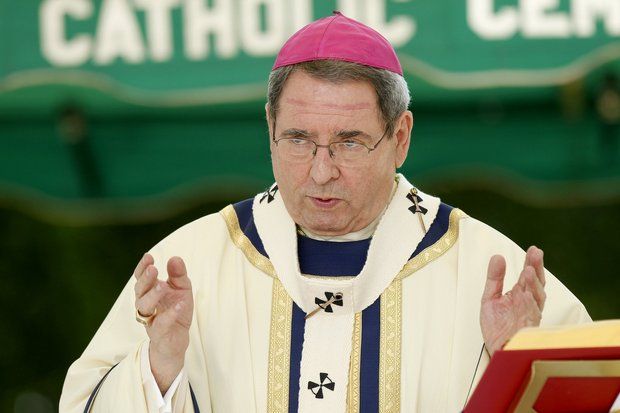Pope Francis to Name Coadjutor Archbishop to Assist Newark Archbishop John J. Myers: Report
By Mark Mueller
Pope Francis Tuesday is expected to name a second archbishop to serve alongside John J. Myers in the Archdiocese of Newark, a development that comes as Myers nears mandatory retirement age and faces continuing criticism over his handling of abusive priests. Francis will name Bernard A. Hebda, 54, the bishop of Gaylord, Mich., to serve as coadjutor archbishop, according to the National Catholic Reporter, an independent Catholic newspaper. Myers’ spokesman, Jim Goodness, declined to comment on the report but said an “announcement of significance” was planned for 11 a.m. Tuesday at the archdiocesan offices in Newark. Hebda will assist Myers in running New Jersey’s largest diocese, with more than 1.3 million Roman Catholics in Essex, Union, Hudson and Bergen counties. Myers has been archbishop since 2001. Advocates for victims of clergy sex abuse suggested the move was almost certainly tied to scandals that have clouded Myers’ stewardship of the archdiocese this year. During that period, one priest was arrested after violating a ban on ministry to children, and another took up residence in a parish despite a credible history of sexual abuse. Myers also was faulted last month for missing or ignoring signs of abuse among priests during his former assignment as bishop of Peoria, Ill. Experts on the Vatican were more circumspect, noting that while the new pope may have been influenced by the troubles in Newark, the appointment could be the result of other factors, including Myers’ health or a request by the archbishop for help. Myers is 72, about three years short of the mandatory retirement age for bishops. Asked about Myers’ health this evening, his spokesman replied: “Very fine. Doing quite well.” The Rev. Thomas Reese, a senior analyst for the National Catholic Reporter and the former editor of America, a Catholic magazine, said the appointment of coadjutor bishops has become quite rare in recent years, with just a handful now serving in the United States. They were far more common before the mandatory retirement rule went into effect, Reese said, because aged, ailing bishops would be unable to carry out the job on their own. Myers served as coadjutor bishop for three years in Peoria before taking over the diocese there. Reese said he had no inside knowledge of the pope’s selection of Hebda, but he praised it as a “great appointment.” “I don’t think the pope could have found someone better,” Reese said. “He’s smart, he’s got a sense of humor, he’s very pastoral, and he’s someone who understands the sex abuse issue. He’s on the side of the angels.” Hebda, initially a priest in the Diocese of Pittsburgh, was named bishop of Gaylord in 2009. Before that, he served for 13 years in Rome on the Pontifical Council for the Interpretation of Legislative Texts, a panel that interprets canon law. Hebda is both a canon lawyer and a civil lawyer. “Newark is extremely lucky,” said Nicholas Cafardi, a former chairman of the U.S. Conference of Catholic Bishops’ National Review Board for the Protection of Children and Young People. Cafardi, also dean emeritus and a professor of law at Duquesne University, knows Hebda from his days in Pittsburgh and briefly employed him at a law firm. Hebda “is all the things Pope Francis says he is looking for in a bishop: a shepherd who smells of his sheep,” Cafardi said. “He’s not a careerist. He will give his whole life to the people and priests of the Archdiocese of Newark. There’s no guile in him.” How big a role Hebda will play in Newark remains to be seen. The Vatican sometimes grants coadjutors so-called special powers, with jurisdiction over a seminary or sex-abuse cases, for instance, Reese said. If special powers are not granted, a coadjutor theoretically works under the authority of the archbishop, like an auxiliary bishop. Newark has four auxiliary bishops already, each tending to a county in the archdiocese. Tuesday’s announcement might not shed any light at all on the arrangement, Reese said, because the Vatican doesn’t always feel the need to explain itself. “Sometimes the Vatican leaves everything vague,” he said. “They might say, ‘We’re not granting special powers, but you better listen to this guy because he knows what he’s talking about.’ There’s often a lot of unanswered questions.” Myers’ critics were cautiously optimistic about Hebda’s appointment, saying Myers had lost moral authority in Newark. “Hopefully, he is going to make a difference,” said Mark Crawford, the New Jersey director of the Survivors Network of those Abused by Priests, a national advocacy group. “Archbishop Myers is so compromised that they absolutely need to bring someone else in to run this archdiocese. “He has not just lost the trust of the faithful, he has lost the trust of his priests,” Crawford said. The Rev. Robert Hoatson, a former priest who now heads the group Road to Recovery, repeated his call for Myers to resign. Hoatson said he and other members of his group plan to picket outside the archdiocese during today’s announcement.
|
.
Any original material on these pages is copyright © BishopAccountability.org 2004. Reproduce freely with attribution.
